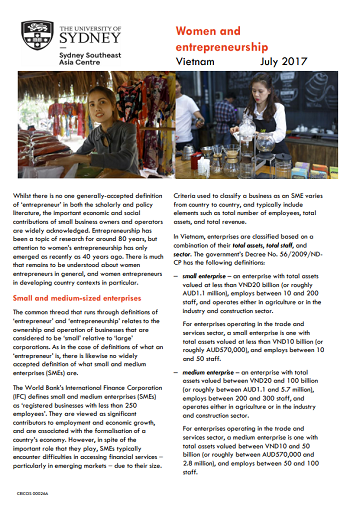Summary
This series of factsheets discusses the opportunity to help improve the economic participation rate of women, particularly in business.
Focusing on Indonesia, the Philippines, and Vietnam, these reports provide an overview of the definitions of the different types of enterprises according to national regulations.
The reports attempt to estimate the number of women’s small and medium enterprises (SME), highlighting the lack of data readily available data on gender of SME ownership. They then examine the gender gaps in economic participation in each of the country contexts.
This series of factsheets was published by the Sydney Southeast Asia Centre at the University of Sydney, commissioned by Investing in Women.
Highlights
- The reports suggests important opportunities to help improve the economic participation rate of women in general, and the participation rate of women in business in particular.
- They further points to the need to support the transition of micro enterprises to small businesses, and for small businesses, in turn, to further grow into medium and large enterprises.
- This resource gap signals a critical opportunity for investors to play an important role not only in SME development, but also in raising the economic participation rate of women as business owners and employers in each of the countries.
View other Resources
Closing the Gender Finance Gap
This fact sheet is presents key findings of the gender finance gap report that discussed the opportunities for gender lens investing in the Philippines.
Impact Investing in Southeast Asia
This fact sheet provides updated analysis on trends in impact investing in Southeast Asia for 2020 to 2022.
Gender Lens Investing in Southeast Asia
This report provides updated analysis on trends in gender lens investing in Southeast Asia for 2020 to 2022.


